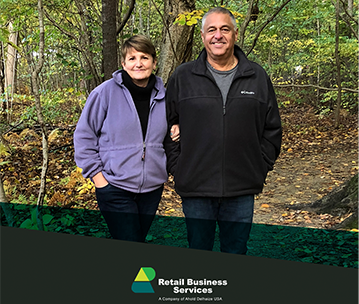Wayne Rogiers Reflects on Decades in IT
 When Wayne Rogiers, Director of Service Integration for Retail Business Services, the services company of Ahold Delhaize USA, started his IT career in 1976, he could not have imagined the technology he’d be working with in 2020.
When Wayne Rogiers, Director of Service Integration for Retail Business Services, the services company of Ahold Delhaize USA, started his IT career in 1976, he could not have imagined the technology he’d be working with in 2020.
“Every year the speed of change is orders of magnitude faster,” he said. “It’s hard to keep up on the one hand, and it’s hard to even imagine where things will be on the other hand. Take cell phones, for instance. When they first came out, they were the size of a knapsack – ‘bag phones’ we used to call them. They were huge. Now you’ve got Space Shuttle computing capacity in your hand with an iPhone.”
This December marks Wayne’s 44th anniversary in IT, and his 50th overall with Ahold Delhaize USA brands – something else he never could have imagined when he accepted a part-time job bagging groceries at age 16. Though Wayne now lives and works out of Salisbury, N.C., he started with the Stop & Shop brand in Massachusetts.
“I remember when I was close to graduating from college, my store manager asked me if I’d ever considered a career with Stop & Shop,” Wayne recalled. “I looked him right in the eye and laughed and said, ‘Doing what?’”
But Wayne, who was wrapping up a degree in mathematics, was fascinated by the emerging world of computer programming. That same year, Stop & Shop debuted a training initiative for programmers, and Wayne – who always knew a good opportunity when he saw one – jumped at the chance.
In 1976, IT was a very different world. Computers took up entire rooms and had limited uses.
“Stop & Shop’s computers only did massive overnight processing of orders for stores – nothing else,” he said. “You’d have stores fill out punch-paper tape and use that to transmit orders into a receiving system, which would translate it into selection documents for the warehouses. We couldn’t spell ‘PCs’ in 1976. There was no word processing, let alone a laptop on everyone’s desk. You had typewriters and carbon paper.”
Back then, Wayne oversaw working with the business to determine what was needed, writing code, programming it into the computer and fixing any errors or hang-ups the computer might have. For a while, IT drifted away from that holistic approach, he said, and jobs became compartmentalized. But now it’s shifting back again.
“It feels like we’re almost coming full circle,” he reflected. “Dev-ops – development operations – is the buzzword of 2020, and that’s the model the field seems to be moving towards, where the same folks are doing the coding and the operations support. It feels likes déjà vu all over again.”
And while technology has changed, the job and the skillset needed have not.
“Programmers tell computers what to do to support a business – whether you’re back in the day writing a lot of code because the computers aren’t very smart, or today where you don’t need to write a lot of code because the computers are that smart,” he said. “Either way, you’re still doing the same thing. And our great local brands still sell groceries. That’s what our business is. At the end of the day, it’s kind of that simple – and everything else we do is about making that process better.”
But that doesn’t mean there haven’t been times and advancements that were more challenging than others. Wayne said he vividly recalls when word processing was introduced and became an office staple.
“That was sort of the first foray into getting computers on people’s desks,” he said. “They were just typewriters with screens and printers attached to them, that’s all they were at the time. But that was the first step in getting people comfortable with having a computer on their desk that was more than just an adding machine.”
Wayne joined Retail Business Services when the company launched in 2018, and he doesn’t have plans to retire any time soon.
“It really has been great,” he said. “All in all, the company has been very good, I’ve had no reason to want to go anywhere else. I’ve been challenged, I’ve been recognized, I’ve been appropriately rewarded – if you’re happy, why change?”
And for those entering the workforce, he has a few words on advice on how to reach 20, 30 or 50 years with an organization.
“Be open to change,” he said. “See it as an opportunity, not as a detriment; and understand how you can participate in it. Change can be challenging, but I think change is good. As long as you’re open to it and realize that it’s being done for the right reasons, it’s easier to go with it and realize it’s not a bad thing.”